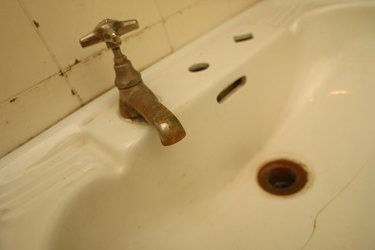 Changes in humidity and temperature create mold and rust. Image Credit: Jupiterimages/Photos.com/Getty Images
Changes in humidity and temperature create mold and rust. Image Credit: Jupiterimages/Photos.com/Getty Images
Don't take chances with unheated homes. It might not seem like a big deal at first, but subtle changes in air moisture can compound and create problems that have lasting effects on your home. Inclement weather and temperatures that dip down into freezing can wreak havoc on almost any unheated home, in almost any climate. Awareness and preparation can help to minimize or eliminate the damage.
Plumbing
Plumbing is the main concern when evaluating winter damage. Even homes with the best insulation will freeze inside if they go long enough without heat. And most plumbing lines are located in walls, which promotes even faster freezing of the pipes. Even slightly freezing temperatures will cause pipes to shatter or split. When this happens, the remaining water drains out into the room, inside the walls or pools in the basement. If the water is still on, it fills basements or low spots, causing you to lose the house completely if not discovered for a period of time. If you live in any area where freezing is common in winter, drain all waterlines. Use potable antifreeze or RV antifreeze to fill toilet bowls, traps under the sinks or anywhere you can add antifreeze into the system to prevent freezing pipes.
Rust and Mold
Weather changes include fluctuations in humidity. When the temperature drops below the dew point in any home, moisture is created. It forms on the walls, ceiling, floors, inside walls and windows. It creates rust on metal items such as wood stoves, fixtures and metal appliances. Alleviate this problem by rubbing down metal items with a thin coat of petroleum oil. Mold can form almost anywhere. It can be removed from exterior surfaces easy enough using bleach, but if the mold grows inside the walls, under the floor or between rafters or joists, it requires professional removal to prevent serious health problems. If you absolutely can't heat the home, dehumidifiers can help to alleviate the detrimental effects of mold. When purchasing a dehumidifier for this purpose, check the performance of the unit at colder temperatures and purchase accordingly.
Flooring
Temperature and humidity fluctuation can ruin hardwood flooring. No matter how well the flooring is finished, the constant expansion and contraction of individual boards in the floor causes buckles, warps, twists and bubbles on the floor that cannot be repaired. Never leave a hardwood floor in an unheated environment if possible. If you absolutely have to leave the home unattended, use a cold weather dehumidifier, or ideally, electric heaters set above freezing to keep the temperature moderated. Most cabins, lodges or unattended homes do not use tongue-and-groove hardwood flooring, opting instead for loosely placed rustic boards that can expand and contract at will without doing any damage to the home or other boards.
Materials Products
Other items that cause permanent damage to unheated homes are products that you might have forgotten about. Paint, finishes, glue, drywall compound, latex or water-based finishing products, other products that contain water can freeze and break, spilling the contents across floors and walls. Food containers freeze and break. Some food containers run the risk of developing health issues when frozen, without any visible changes. Clean out fridges, closets pantries or anywhere food or products are stored to prevent contamination or breakage due to unheated homes. It's also a good idea to remove loose carpets, curtains, bedding or any other furniture or clothing items that might become damp and mildewy in unheated areas.


